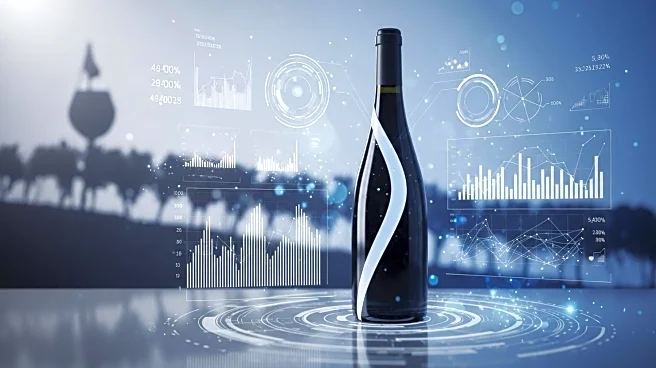What is the story about?
What's Happening?
The Vine to Mind conference, organized by EHL Hospitality Business School and the Harvard Data Science Initiative, highlighted the growing role of data science in the wine industry. The event, held in Lausanne, Switzerland, brought together experts from over 20 countries to discuss how data analytics can improve yield forecasting and decision-making in viticulture. Key speakers, including Dr. Xiao-Li Meng from Harvard University and Cathy Huyghes, CEO of Enolytics, emphasized the importance of bridging the data literacy gap among wine producers. The conference showcased how data can aid in predicting weather patterns, berry weight, and cluster counts, which are crucial for maintaining the quality and reputation of vineyards. Despite the traditional nature of the wine industry, there is a gradual acceptance of technology, with firms like Scout providing timely data to help grape growers make informed decisions.
Why It's Important?
The integration of data science into the wine industry represents a significant shift towards modernizing traditional practices. By utilizing data analytics, wine producers can enhance their forecasting abilities, reduce risks associated with weather and disease, and ultimately improve the quality of their products. This technological advancement is crucial for maintaining competitiveness in a global market where precision and efficiency are increasingly valued. The adoption of data-driven strategies can lead to better resource management, cost savings, and increased profitability for wineries. Moreover, it opens up opportunities for innovation in wine production, potentially leading to new flavors and blends that cater to evolving consumer preferences.
What's Next?
The next Vine to Mind conference is scheduled to take place in Napa Valley, California, in 2026, indicating a continued focus on integrating data science into the wine industry. As more wineries embrace technology, there may be increased collaboration between tech firms and wine producers to develop tailored solutions that address specific industry challenges. Stakeholders, including vineyard owners and data scientists, are likely to explore further applications of AI and machine learning to optimize various aspects of wine production. Additionally, there may be efforts to standardize data collection and sharing practices to enhance the overall effectiveness of data-driven decision-making in viticulture.
Beyond the Headlines
The adoption of data science in the wine industry raises ethical and cultural considerations, particularly regarding the balance between traditional craftsmanship and technological innovation. While data can enhance efficiency, there is a risk of diminishing the artisanal aspect of winemaking, which is deeply rooted in cultural heritage. The industry must navigate these challenges carefully to preserve the authenticity and uniqueness of wine while embracing modern advancements. Furthermore, the reliance on data and AI introduces concerns about data privacy and security, necessitating robust measures to protect sensitive information.

















